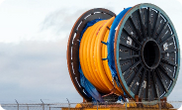SJTW vs. SJOOW - Which Junior Portable Power Cable To Choose?

Choosing a portable power cord for an electrical project boils down to understanding the letter codes in portable power cables' names regulated by Underwriters Laboratories (UL) in the United States. In this blog, we compare the two most popular 300v service cords -SJTW and SJOOW.
What is a junior service power cord?
A junior service power cord has all the features of a standard power cord, except its voltage rating is 300 volts instead of 600 volts. Therefore, it is intended for similar applications as a standard portable power cable but for moderate rough use instead of harsh service. The applications for junior power cords are also sometimes referred to as light-duty use, which is legit. However, they can be misleading because they can still be applied in rather challenging industrial conditions, though lighter than their 600v counterparts.
What is a SJOOW Portable Power Cable?
SJOOW is by far the most popular among junior service power cords as it is the most versatile one because of its construction. This cable is also known for being flexible and having a high-temperature range for a portable power cable.
It is a junior service portable power cord with oil-resistant insulation and outer jacket, as indicated by the letters "OO" in its name. The cable jacket is also weather-resistant and water-resistant, as indicated by the letter "W." This also means that the cable is resistant to UV and ozone.
SJOOW has EPDM rubber thermoset insulation and EPDM neoprene jacket.
The variation of this cable is SJOW (the cable only has an oil-resistant jacket and not insulation, so it is at risk of oil impact if penetrated).
What is an SJTW Portable Power Cable?
SJTW is a junior service power cord with thermoplastic insulation, as noted by the letter "T" in its name. The most common thermoset insulation used in SJTW is the budget-friendly PVC, though other types may also be used. SJTW cable itself is only resistant to the impact of water and weather. However, the cable has two variations: SJTOW has an oil-resistant jacket, and SJTOOW has both an oil-resistant jacket and oil-resistant insulation.
SJTW and SJOOW: Differences and Similarities
- Both are junior service power cords ranked 300v, making them applicable to very similar applications.
- Both cables are perfect for small equipment and motors, both industrial and domestic.
- Both cables are rated for outdoor and indoor use.
- The main difference between the cables is that SJTW has thermoplastic insulation, whereas SJOOW has thermoset rubber insulation. This difference makes SJOOW a more flexible cable. SJTW has another benefit- it's a more durable cable.
- SJTW and SJTOOW are more often used in lights and sound equipment because these cables are more durable.
- SJTW and SJTOOW are cheaper, especially if they have PVC insulation, which is one of the cheapest on the market.
- SJOOW is the best choice if the portable equipment calls for some flexibility.
- SJOOW has a continuous operating temperature of 90°C and a max temperature of 105°C. Meanwhile, the maximum operating temperature of SJTW is only 60°C.
- SJTW and SJOOW have other differences caused by thermoplastic vs. thermoset insulation. They vary in height and have different tolerance to temperatures. You can find out more in our blog dedicated to the differences between thermoplastic and thermoset insulations.
- SJTW cable does not have double oil protection with oil-resistant insulation and jacket, while SJOOW has it. For double protection from oil with thermoplastic insulation, use an SJTOOW cable.
Nassau National Cable offers high-quality SJTOW and SJOOW junior portable power cables at good pricing points, as well as a large range of portable power cables of all types.
















